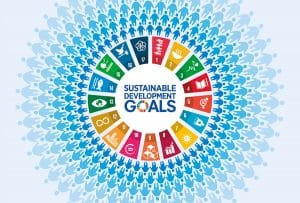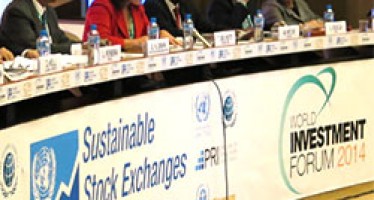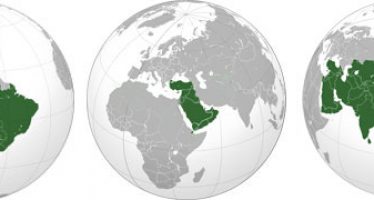UNOG on Perception Change Project (PCP): What Does the PCP Do for SDGs?
 Negative news dominating the headlines leads people to believe that the state of the World is worsening.
Negative news dominating the headlines leads people to believe that the state of the World is worsening.
This is a misconception. Positive developments related to global challenges are happening every day — so why aren’t these stories being told?
The objective of the Perception Change Project (PCP) is to tell the full story with news that highlights the challenges, while showing solutions, progress and results of the positive impact made by International Geneva.
The objectives go hand-in-hand with PCP efforts to promote the Sustainable Development Goals (SDGs), and provide simple and practical solutions to achieve them.
When the former director-general Michael Møller launched PCP in 2014, one of the priorities was to create a visual overview of International Geneva’s core expertise, along with the main SDGs on which each organisation focuses. PCP created SDG Mapping, with over 70 Geneva-based organisations participating. The fold-out map converts complex data into a clear and comprehensive visual, offering actors the opportunity to connect with like-minded organisations.
The map was updated and made interactive and accessible online. Through the online mapping tool, every researcher is able to get a snapshot of who does what for the SDGs in International Geneva.
“PCP, as a communication space, has many touchpoints to connect humanity worldwide to the SDGs, and 2020 is set to be an exciting year.”
For a more in-depth understanding of International Geneva’s work, the GVAData project was launched. It is as an easy-to-navigate online compilation of all the current work of over 200 actors in International Geneva.
Using constructive feedback, the site was revamped to better address the needs of its target audiences, namely academics, but open to all interested parties. GVAData aims to become the go-to portal for information about International Geneva, and it now includes links to data sites run by other international organisations, as well as a list of SDG resources.
The PCP team wanted to raise the profile of the SDGs. One of the most effective ways to do this was by making them visible to travellers passing through airports.
The global campaign YouNeedToKnow was created in partnership with the travel retailer Dufry. It was launched at Geneva Airport and later rolled-out in 10 airports worldwide, including Zurich (during the World Economic Forum in Davos), Italy, Britain, Greece, Spain, Portugal, Bulgaria, Morocco and Algeria.
The campaign runs during peak traffic periods, and while it reaches a wide audience, PCP also focuses on awareness-driven projects to target niche audiences.
It produced a children’s SDG storybook, Fairy Tales for a Fairer World. Traditional tales were adapted to highlight some of the modern global challenges. The book, originally in English, was translated into French, Russian, Chinese, Arabic, Greek, Polish and Spanish by volunteers in the UN translation units. It has been distributed at events including Expo 2017 in Astana, the Salon du Livre in Geneva and at the UN Geneva Open Day.
Following this success, PCP created a booklet entitled 170 Daily Actions to Transform Our World. It encourages individual efforts and reminds the public that no contribution is too small to make a lasting impact. The booklet, in English and French, was distributed to over 7,000 visitors at the UN Open Day in 2018, and 25,000 copies in English, French and Spanish have been allocated to the visitors’ centre at the Palais des Nations.
The Global Communication Department at UN headquarters requested to use it as part of the SDGs website, and offered to translate it into Russian, Chinese and Arabic. UNRIC Brussels translated it into Portuguese and Greek. The Danish United Nations Association translated it into Danish, and the United Nations Baku Azerbaijan translated it into Azeri. German and Italian copies have been distributed around Switzerland to promote International Geneva. Design students have turned the 170 actions into GIFs, which have been shared on social media.
Social media is a powerful tool for promoting the SDGs. One initiative was the Impact Infographics campaign showing the impact made by International Geneva. PCP collaborated with over 100 partnering organisations to capture important data and translate them into visuals. The SDG Impact Infographics have featured on social media and in the magazine Klvin Mag.
PCP launched the SDG Studio Geneva project with UNTV and the SDG-Lab. It produces videos to communicate the work done to advance the SDGS by International Geneva practitioners. The studio is open to individuals dedicated to delivering the 2030 Agenda from governments, businesses, civil society organisations and academia. More than 90 videos have been produced and shared online.
Celebrities have been interviewed, including Neymar, Michelle Bachelet, Amina Mohammed and Staffan de Mistura. The videos have notched-up thousands of views on YouTube and Facebook — and the clip of Neymar is one of the most-viewed videos on the UN Geneva’s Facebook page.
PCP, as a communication space, has many touchpoints to connect humanity worldwide to the SDGs, and 2020 is set to be an exciting year.
About the PCP
The Perception Change Project (PCP) is a creative space in the Office of the Director-General at UN Geneva. It aims to change the public’s perception of the United Nations by promoting the impactful work of International Geneva.
You may have an interest in also reading…
Uzbekistan on the Path to Becoming Carbon-Neutral
In the race to become carbon-neutral, it is useful to look at where the race began. In Uzbekistan, a nation
World Investment Forum: Seeking Ways to Unlock the Idle Trillions
As the United Nations Conference on Trade and Development (UNCTAD) celebrates its fiftieth anniversary, business and government leaders from across
2012 CFI Top 100 Emerging Markets Companies’ Nominations
The 2011 CFI Top 100 Emerging Market Companies were compiled by using the nominations and the votes from CFI’s subscriber

















































































